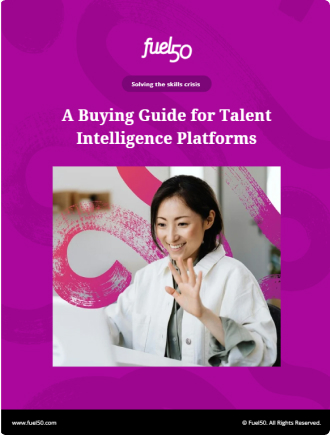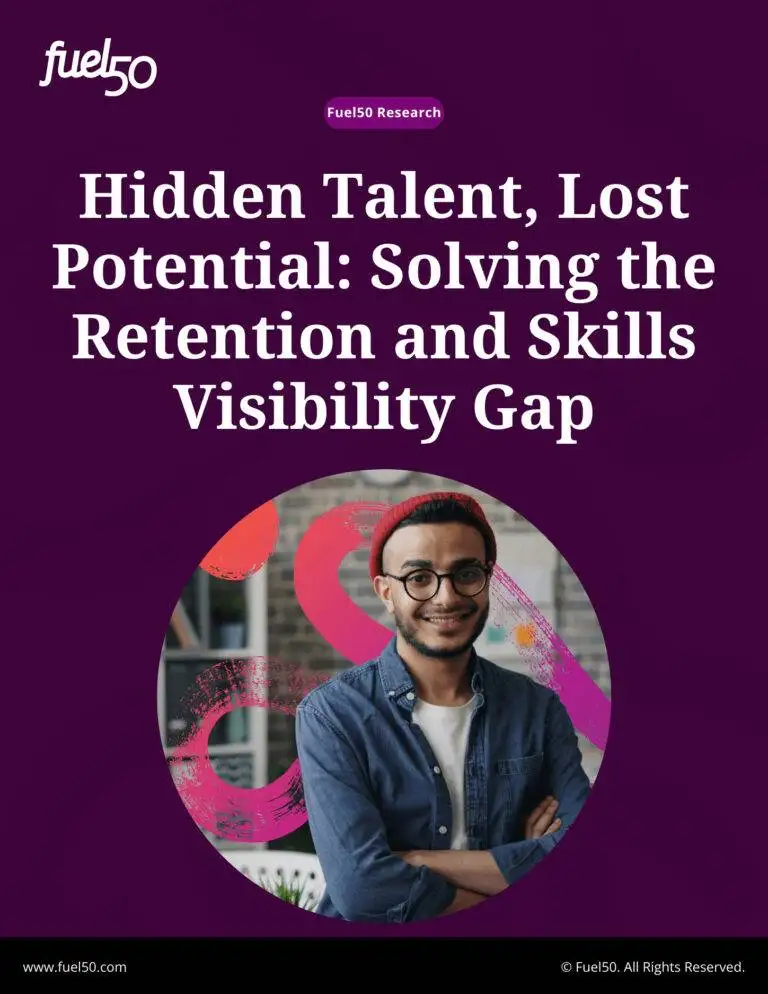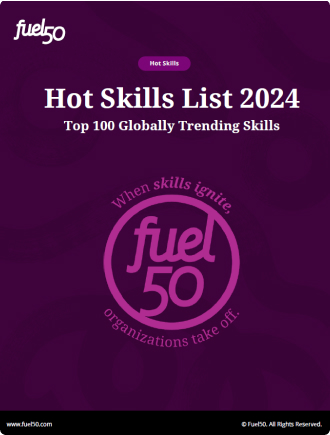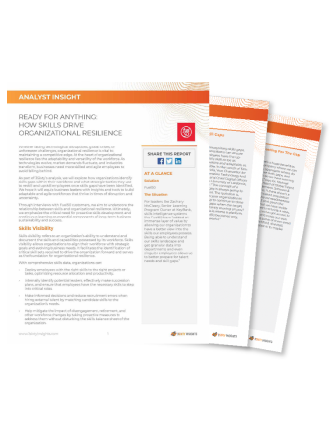We talk to hundreds of HR leaders and executives and most of them are grappling with:
-
Reactive instead of proactive planning: Many HR teams find themselves constantly playing catch-up, unable to anticipate and prepare for future workforce needs. This leads to rushed hiring decisions, skill gaps, and missed opportunities.
-
Lack of visibility into current skills: Without a clear understanding of their existing talent pool, organizations struggle to allocate resources effectively or identify internal candidates for new roles. This results in unnecessary external hiring and underutilized internal talent.
-
Difficulty aligning workforce strategy with business objectives: As business needs shift rapidly, HR often lacks the tools to quickly adjust workforce plans. This misalignment can lead to overstaffing in some areas and critical shortages in others.
These challenges are costing businesses in productivity, employee engagement, and competitive advantage.
If that’s your case, then this article is for you. We’ll examine the top workforce planning solutions in 2024 and will tell you about their pros and cons, helping you identify the best workforce planning software for your needs.
The Urgent Need for Advanced Workforce Planning
These three key factors are driving the urgent need for advanced workforce planning:
Skills obsolescence and the shrinking half-life of professional skills
The accelerating pace of technological advancement is causing professional skills to become outdated at an alarming rate. For instance, an IBM survey estimates that 40% of the company’s workforce will need to reskill due to AI and automation over the next three years.
That means what was cutting-edge just a few years ago may now be obsolete. A data entry specialist, for example, might have to upskill or reskill as AI competes with humans in that area.
This rapid obsolescence affects all sectors, from technology to healthcare, finance, and even traditionally stable fields like law and accounting.
The consequences of this trend are severe. Organizations that fail to keep their workforce’s skills current risk losing their competitive edge, missing out on innovation opportunities, and becoming increasingly inefficient.
Advanced workforce planning tools have become essential for identifying emerging skill needs, forecasting future requirements, and developing strategies to bridge talent gaps proactively. Workforce planning software tools can automate tasks, reduce errors, and improve efficiency in developing strategic workforce plans, making the process less time-consuming and more effective.
Without such tools, companies may find themselves constantly playing catch-up, unable to adapt to market demands or capitalize on new technologies.
Hidden talent and the challenge of internal resource allocation
Many organizations are sitting on a wealth of untapped potential within their existing workforce. According to Josh Bersin, only 32% of HR and business leaders are involved in any form of strategic workforce planning, hence, no efforts towards internal mobility.
This “hidden talent” problem stems from a lack of visibility into employees’ full skill sets and potential, compounded by siloed departments and outdated job descriptions.
The result is a paradoxical situation where companies struggle with skill shortages while simultaneously underutilizing their current employees.
This inefficiency leads to increased hiring costs, longer time-to-productivity for new hires, and missed opportunities for innovation and growth.
Advanced workforce planning software solutions can address this by creating comprehensive skill inventories, identifying high-potential employees for strategic roles, and facilitating internal mobility.
By unlocking hidden talent, organizations can not only reduce costs but also improve employee management, retention and build a more agile, responsive workforce capable of meeting rapidly changing business needs.
Changing employee expectations around career development
The workforce’s expectations about career progression have fundamentally shifted. Today’s employees, particularly the younger generations, expect continuous learning, diverse experiences, and transparent career opportunities from their employer. In fact, 53% of employees would rather develop their skills instead of getting a pay raise.
The traditional model of linear career paths and sporadic training is no longer sufficient to engage and retain top talent.
This shift in expectations has profound implications for workforce planning. Organizations that fail to provide clear development paths and diverse opportunities risk high turnover rates, decreased employee engagement, and difficulty in attracting top talent.
Advanced workforce planning must now incorporate personalized career development plans, clear visibility into internal opportunities, and flexible career paths that allow for both vertical and horizontal growth.
Top Workforce Planning Tools for Enterprise
Here are some of the most referenced different workforce planning tools on G2 and Trustpilot.
Fuel50’s Workforce Planning Capabilities
Key features:
-
AI-driven skills ontology and mapping
-
Personalized career pathing and development plans
-
Strategic workforce-to-business alignment tools
-
Internal talent marketplace for projects and roles

Fuel50 is not a workforce planning software per se, but it does have capabilities that allow organizations to effectively manage and develop their workforce in ways that align with strategic planning.
Our platform is particularly suited for organizations struggling with:
-
Lack of visibility into current employee skills and potential
-
Difficulty in aligning individual career paths with organizational needs
-
Challenges in identifying and developing internal talent for future roles
-
Ineffective internal mobility and talent retention
These pain points often result in missed opportunities for talent development, increased turnover, and misalignment between workforce capabilities and business objectives.
To address these challenges, Fuel50 offers several key capabilities that support effective workforce planning:
-
AI-driven skills ontology and alignment of roles to skills
-
Personalized career pathing and development plans
-
Strategic workforce-to-business alignment tools
-
Internal talent marketplace for projects and roles
These features enable organizations like yours to gain deeper insights into their workforce capabilities, foster employee growth and engagement, and align talent strategies with business goals.
Importantly, Fuel50 can integrate with other parts of the HR technology stack, allowing it to complement and enhance existing workforce planning tools and processes.
Here’s in more details how Fuel50 can help your organization with strategic planning:
Uncover hidden talent and skills gaps
Fuel50’s AI-driven skills ontology is a game-changer for workforce planning. It goes beyond traditional skills mapping by creating a dynamic, evolving picture of your organization’s capabilities.

This system analyzes various employee data sources, including employee profiles, project histories, and even external market trends, to identify both existing skills and potential gaps.
For instance, a tech company using Fuel50 might discover that they have a wealth of machine learning expertise scattered across different departments, which could be pivotal for an upcoming AI initiative.
Simultaneously, it might flag a shortage of blockchain specialists, alerting HR to a potential hiring need before it becomes critical.
This deep insight into the skills landscape allows organizations to make data-driven decisions about training, recruitment, and resource allocation. It’s not just about filling immediate gaps; it’s about strategically developing your workforce to meet future challenges.
Enhance internal mobility and career pathing
Fuel50’s approach to internal mobility is transformative. Rather than relying on traditional, linear career paths, the platform creates a multidimensional map of career opportunities within the organization.

This is crucial for modern workforce planning, where agility and cross-functional capabilities are increasingly valuable.
The platform suggests personalized career paths for each employee based on their skills, interests, and the organization’s needs.
For example, a marketing specialist might be shown potential paths not just within marketing, but also in product management or customer experience roles that align with their skill set and aspirations.
This feature not only helps employees visualize their future within the company but also allows HR and managers to identify high-potential individuals for key roles.
It transforms workforce planning from a top-down exercise into a collaborative process that engages employees in their own development.
Align workforce capabilities with business strategy
One of Fuel50’s most powerful features for workforce planning is its ability to align talent capabilities with strategic business objectives.
For instance, if a company is planning to expand into new markets, Fuel50 can identify employees with relevant language skills or cultural knowledge who might be prime candidates for leading the expansion.
It can also highlight areas where the organization needs to develop or acquire new capabilities to meet its strategic goals.
This alignment ensures that workforce planning is not done in isolation but is intrinsically linked to the organization’s overall direction. It helps prevent the common pitfall of developing talent that doesn’t match the company’s future needs.
Improve employee retention through personalized growth
Fuel50’s personalized approach to career development is a powerful tool for improving employee retention, a critical aspect of long-term workforce planning.
By offering employees clear visibility into growth opportunities and personalized development paths, Fuel50 addresses one of the primary reasons employees leave: lack of career progression.
The platform doesn’t just suggest generic training programs. Instead, it provides tailored recommendations for skills development, mentorship opportunities, and potential project assignments that align with the employee’s career aspirations and the organization’s needs.
For example, an employee interested in moving into a leadership role might be recommended specific leadership training courses, paired with a mentor in a similar role, and given opportunities to lead small projects.
This personalized growth plan not only helps retain valuable talent but also ensures that the organization is continually developing its workforce in alignment with its strategic needs.
By providing deep insights into skills, facilitating internal mobility, aligning talent with strategy, and fostering personalized growth, Fuel50 enables organizations to build agile, future-ready workforces.
Workday Workforce Planning
Key features:
-
Multidimensional modeling for complex workforce scenarios
-
Unlimited scenario planning capabilities
-
Strategic goal mapping for aligning workforce with business objectives
-
Real-time analytics integration with Workday HCM

Workday Adaptive Planning tackles workforce planning with a focus on agility, which is crucial in today’s rapidly changing business environment. If you’re running a large enterprise, you’ll appreciate how it lets you build complex workforce models that account for financial goals, strategic initiatives, and the nitty-gritty of day-to-day operations.
Now, when it comes to scenario planning, Workday offers many more possibilities. Unlike Anaplan, which can get a bit clunky with multiple scenarios, Workday lets you create as many “what-if” situations as you want. That means you can play around with different workforce scenarios until you find the perfect fit for your company’s future.
But here’s where it gets interesting: Workday Adaptive Planning doesn’t just focus on numbers. It’s all about aligning your workforce plans with your big-picture strategy.
For instance, if you’re planning a major expansion, the platform helps you figure out not just how many people you need, but what skills they should have and how that ties into your company’s goals. This is something that SAP SuccessFactors, while robust, doesn’t quite nail as seamlessly.
Now let’s talk about real-time analytics. If you’ve ever used Oracle’s workforce planning tools, you know how frustrating it can be to wait for data updates. Workday, on the other hand, pulls in real-time data from its Human Capital Management system. That means you’re always working with the latest information, not last month’s outdated numbers.
If you’re a fan of getting into the weeds, you’ll love Workday’s bottom-up planning interface. It lets you get granular with your planning, which is great for detailed operational forecasts.
Key benefits:
-
Enhanced agility in workforce planning and adaptation
-
Improved alignment between workforce strategy and business goals
-
More accurate forecasting due to real-time data integration
-
Increased collaboration across departments in the workforce planning process
Key inconveniences:
-
Steep learning curve due to the platform’s complexity
-
Full benefits may require adoption of other Workday products
-
Potentially overwhelming for smaller organizations or simpler planning needs
-
Higher cost compared to some simpler workforce planning solutions
Runn
Key features:
-
Real-time resource allocation and tracking
-
Capacity vs. workload comparison
-
Automated utilization reporting
-
Project-based forecasting

Runn stands out as a workforce planning tool tailored for knowledge workers in consulting, agency, and software businesses. Its strength lies in real-time resource management, making it particularly suited for modern, distributed workforces.
The platform’s People Planner offers a comprehensive view of team workloads, allowing managers to compare capacity with confirmed work. This visibility into bookings and utilization rates helps identify potential bottlenecks or underutilized resources quickly.
Runn’s forecasting capabilities set it apart from competitors. By integrating project data with workforce information, it provides insights into future resource needs and potential skill gaps. This forward-looking approach enables proactive workforce planning, rather than reactive adjustments.
Unlike more rigid systems, Runn accommodates various work arrangements – onsite, hybrid, remote, and across different time zones. This flexibility makes it a valuable tool for global teams or organizations with complex workforce structures.
Key benefits:
-
Improved resource utilization
-
Proactive workforce planning
-
Enhanced project profitability insights
-
Adaptability to various work arrangements
Key inconveniences:
-
May be overly complex for very small teams
-
Primarily focused on project-based work
-
Limited HR functionality compared to full-suite solutions
Oracle HCM Cloud
Key features:
-
AI-driven predictive analytics for workforce trends
-
Comprehensive “skills nexus” for talent mapping
-
Scenario modeling for workforce planning
-
Integrated succession planning tools

Oracle HCM Cloud offers a comprehensive workforce planning solution as part of its broader human capital management suite. The platform leverages AI and machine learning to provide predictive analytics for workforce trends, setting it apart from competitors like Workday in terms of advanced forecasting capabilities.
A key feature of Oracle HCM Cloud is its “skills nexus” approach to talent management. This system maps skills across the organization in a flexible, interconnected manner, providing a more nuanced view of workforce capabilities compared to the more rigid categorization found in systems like SAP SuccessFactors. This enables more accurate identification of internal candidates for new roles and better strategic workforce planning.
The platform’s AI-driven predictive analytics can also identify potential flight risks among employees, allowing proactive retention strategies.
Additionally, Oracle HCM Cloud offers robust scenario modeling tools for workforce planning, enabling organizations to test various workforce strategies and their potential outcomes.
Oracle HCM Cloud integrates workforce planning with other HR functions such as recruitment, succession planning, and retirement management, providing a holistic view of the employee lifecycle. This integration allows for more coherent long-term workforce strategies aligned with overall business objectives.
Key benefits:
-
Enhanced ability to predict and prepare for workforce changes
-
More flexible approach to skills management and development
-
Improved alignment of workforce planning with overall business strategy
-
Seamless integration across the entire employee lifecycle
Key inconveniences:
-
Can be complex to implement, especially for smaller organizations
-
Requires significant data input to leverage full predictive capabilities
-
May have a steeper learning curve for users accustomed to simpler systems
-
Pricing can be on the higher end of the spectrum
Deel
Key Features:
-
Global workforce overview (employees and contractors)
-
Advanced payroll and benefits administration
-
Comprehensive reporting and analytics
-
Clean, user-friendly interface

At its core, Deel provides a single source of truth for the entire workforce, eliminating the need to compile data from disparate sources.
This consolidated view is crucial for strategic workforce planning, enabling accurate forecasting and resource allocation.
Deel’s platform allows organizations to analyze current staffing levels, identify skill gaps, and project future needs across different regions and departments. This global perspective is particularly valuable for companies navigating complex international labor markets.
Beyond basic workforce management, Deel offers sophisticated tools for talent acquisition and retention on a global scale. Its platform facilitates international hiring by simplifying compliance with local labor laws and tax regulations.
This feature allows companies to tap into global talent pools more effectively, aligning workforce capabilities with strategic business objectives.
Deel’s advanced analytics capabilities provide insights into workforce trends, productivity metrics, and cost analysis across different geographical locations. These tools enable data-driven decision-making in areas such as succession planning, skill development, and resource optimization.
The platform also addresses the unique challenges of managing a distributed workforce. It offers features for remote onboarding, performance management, and employee engagement, ensuring cohesive team dynamics despite geographical distances.
Key benefits:
-
Simplified management of international workforce
-
Consolidated administrative costs
-
Improved decision-making through comprehensive data
-
Streamlined HR processes across multiple countries
Key inconveniences:
-
Complexity for smaller or local-only organizations
-
Potential learning curve for full feature utilization
-
Higher costs for advanced features or large teams
-
Less focus on traditional workforce planning elements
-
Possible over-reliance on a single platform for multiple HR functions
-
Complexity in managing data privacy across multiple countries
SAP SuccessFactors Workforce Planning
Key features:
-
Deep HR and finance data integration
-
Predictive analytics using machine learning
-
Global compliance and localization tools
-
Comprehensive scenario modeling

SAP SuccessFactors’s strategic workforce planning tools integrate HR and financial data for comprehensive workforce strategy. Its machine learning algorithms predict skill gaps and attrition risks, offering insights beyond basic analytics.
The platform excels in global compliance, with built-in features for navigating diverse labor laws. This makes it particularly valuable for multinational corporations managing complex regulatory environments.
SAP’s integration capabilities set it apart. Workforce data directly informs financial forecasts, creating a unified view of human capital and business performance. However, this integration is most effective within the SAP ecosystem.
Implementation can be challenging, especially for non-SAP users. The learning curve is steep, and customization often necessary. While powerful, the platform’s complexity and cost may be prohibitive for smaller organizations or those seeking simpler solutions.
Key benefits:
-
Aligned financial and workforce planning tools (all in one)
-
Predictive insights for proactive management
-
Effective handling of global workforce complexities
-
Holistic view of workforce impact on business outcomes
Key inconveniences:
-
Complex implementation process
-
Steep learning curve
-
High cost, especially for full suite
-
Most effective within existing SAP infrastructure
Anaplan for Workforce Planning
Key features:
-
Hyperblock technology for real-time calculations
-
Collaborative planning interface
-
Flexible scenario modeling
-
Strong data integration capabilities

Anaplan’s workforce planning software offers a flexible, cloud-based platform for organizations to model and analyze their workforce needs. The solution stands out for its ability to handle complex, large-scale workforce planning scenarios across multiple departments and regions.
Key to Anaplan’s approach is its proprietary Hyperblock technology, which allows for real-time calculations and updates across interconnected workforce models.
This enables organizations to quickly adjust their plans in response to changing business conditions, a capability that sets it apart from more static workforce planning tools.
Anaplan’s workforce planning tools emphasize collaboration, allowing multiple stakeholders to work on plans simultaneously. This feature facilitates better alignment between HR, finance, and operations teams, addressing a common pain point in workforce planning processes.
The platform provides robust scenario modeling capabilities, allowing organizations to compare different workforce strategies side-by-side. While this feature is also present in competitors like Workday, Anaplan’s approach is particularly user-friendly, making it accessible to non-technical users.
Anaplan also offers strong data integration capabilities, able to pull in data from various HR systems, financial platforms, and other sources. This provides a more comprehensive view of workforce-related data compared to solutions that are limited to their own ecosystem.
Key benefits:
-
Improved agility in workforce planning
-
Enhanced cross-departmental collaboration
-
Ability to handle complex, large-scale planning scenarios
-
User-friendly interface accessible to non-technical users
Key inconveniences:
-
Can be complex to set up initially
-
Requires ongoing maintenance to keep models accurate
-
May be overkill for smaller organizations with simpler planning needs
-
Pricing can be higher compared to less specialized planning tools
Choosing the Right Workforce Planning Tool for Your Organization
The landscape of workforce planning tools is diverse, with each solution offering unique strengths and potential trade-offs. The best choice for your organization will depend on your specific needs, challenges, and long-term objectives. As you evaluate these options, consider:
- Which features are essential for your workforce planning needs?
- What capabilities would be nice to have but aren’t critical?
- How well does each platform align with your organization’s culture and future vision?
- What are outcomes you’d want from your workforce planning tool?
However, if you’re seeking a workforce planning solution that:
-
Provides deep insights into your current workforce capabilities and future needs
-
Offers flexibility to adapt to your organization’s evolving requirements
-
Integrates seamlessly with your existing HR tech stack
-
Empowers your employees while aligning their growth with organizational goals
Then you may want to look closely at Fuel50. Our platforms offer comprehensive workforce planning capabilities that go beyond traditional approaches, helping you build an agile, future-ready workforce.












